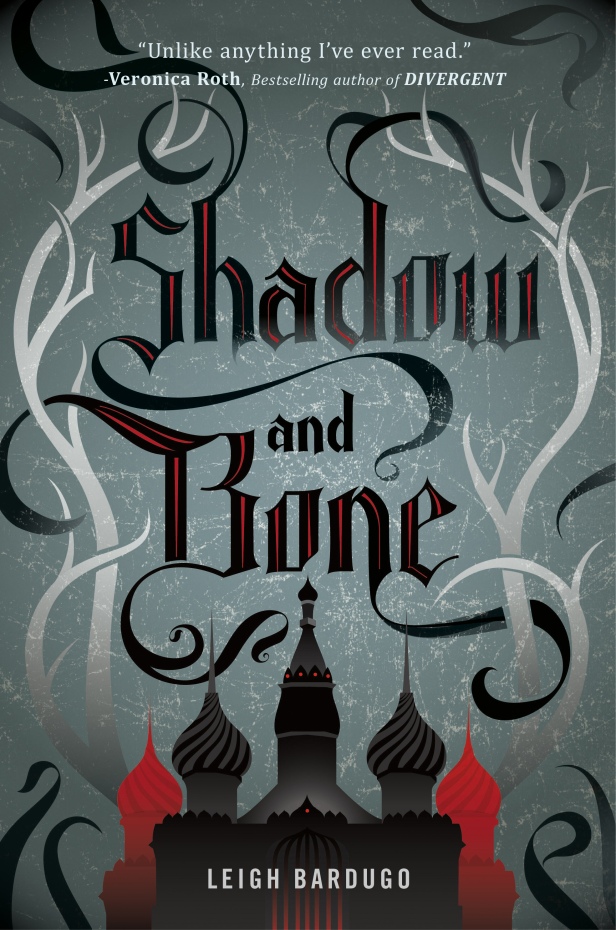By Leigh Bardugo
♦♦♦◊◊
Alina Starkov doesn’t have much of a place in the world. She’s an orphan, one soldier among many, a face in the crowd with no home to call her own. Her best friend Mal is the only one who’s ever made her feel like she belonged anywhere, but she’s starting to doubt he shares her feelings.
All of this changes when their regiment is sent across the Shadow Fold. During a vicious attack, Mal is wounded and Alina discovers a power she never knew she had. Suddenly she is being swept away to the capital, into the care of the mysterious Darkling, to train as a Grisha. There, Alina belongs. She has to belong. Because her power might be the key to ending the war and destroying the Shadow Fold itself.
This book was good. It wasn’t perfect, but it was good. The prose is visually evocative – though my barometer for that remains A Thousand Nights and that’s pretty hard to beat – and the plot goes through some fun twists and turns. Alina is a nice-enough protagonist, though there’s nothing to really separate her from every other YA female protagonist out there; Average-looking girl? Check. Loyal to her friend? Check. A bit of a tomboy? Check. Resourceful but not too much so as to not destroy any sense of suspense? Check. Empathetic and kind, but willing to make morally ambiguous choices for the greater good? Check. It’s all fairly standard stuff as far as heroines go, but none of it is really bad.
Mal was the weakest character for me, because we spend so little time with him and yet he’s instrumental not only to the plot but to Alina’s character as well. He’s just never fleshed out enough to be much more than a plot device for me. When he’s in danger, I’m sad because Alina is sad, but not because I actually care all that much for Mal outside of that. And this is a problem, because Mal is important but his character and personality is non-existent. Alina’s feelings for him take up so much of her character development and influence so much of the plot, and after an entire book I still wouldn’t be able to tell you why she loves him, or why he loves her, aside from the fact that they have a history together. And that is not enough to build a romance on, people.
The secondary characters were almost all fleshed out more than Mal, and I ended up liking them better for it. They have their own goals and fears and morally-ambiguous methods that don’t necessarily align with Alina’s own goals and fears and morally-ambiguous methods, and it gives the whole story a sense of character realism.
I’m a sucker for any fantasy world based on Not-Medieval-Western-Europe, so huzzah for some pseudo-Russia worldbuilding! This pseudo-Russia is surrounded by a pseudo-Scandinavia to the north and a pseudo-China to the south, and some kind of pseudo-Germany(?) across the sea, so we do get the sense that this world is more than just one country big, even though we don’t get to learn much about any of those other countries. (Pseudo-Scandinavians are blond and send assassins everywhere, pseudo-China occasionally produces mercenaries, and pseudo-Germany(?) has boats. It’s not much, but it’s something).
Although if pseudo-Russia is unbearably cold in its northern regions, how is the climate in pseudo-Scandinavia remotely conducive to the kind of centralized agriculture needed for the creation of a nation-state or a military force? But I digress.
Oh, and the magic was cool. I wish we could have learned more about how the magic works.
The only thing I actively disliked about this book was the reliance on love-triangle tropes for what appears to be no real reason. Can we just make a pact to stop throwing love triangles in every YA fantasy? Your heroine can be conflicted between two paths without those paths being personified by cute guys. Also having one guy turn evil is not a good way to resolve your love triangle why is this even a thing. Not to mention that in this particular case, the way it was framed was weird. If Mal is literally an obstacle to her well-being (and I mean that objectively, her efforts to suppress her Grisha powers so that she can stay with him make her physically weak and sickly), why should I want them to end up together? And while Mal doesn’t know that’s what Alina is doing, it’s implied by the ending that he would rather she not be Grisha even though she doesn’t have a choice in the matter. And I know the Grisha as an institution are self-serving and problematic, but there’s a difference between I’d rather you not be a part of this formal institution because their morals are iffy and I really wish you could erase this part of yourself for my convenience. All in all, it really does seem as though turning one point of the love triangle evil was the only way for Mal to seem like a good choice for Alina.
Things I want from the sequel: more magic and worldbuilding, more cool adventures, less love triangle nonsense. пожалуйста.

